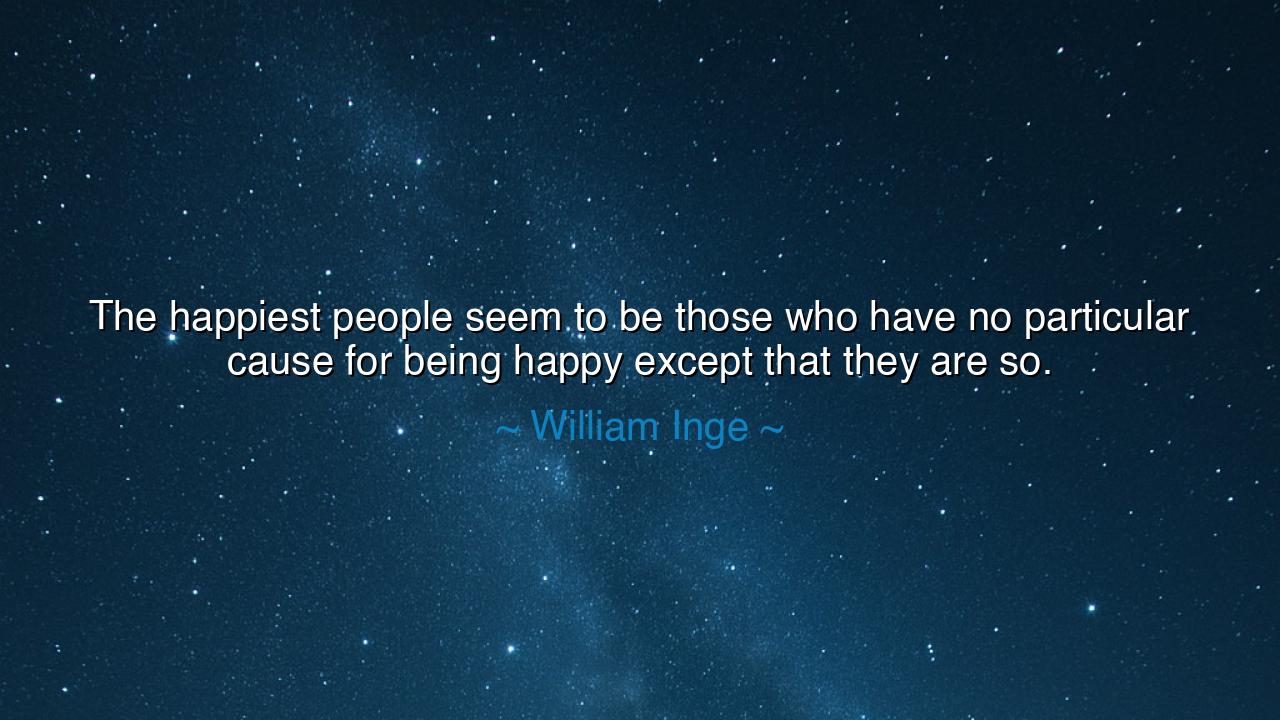
The happiest people seem to be those who have no particular cause
The happiest people seem to be those who have no particular cause for being happy except that they are so.






Hear the quiet yet profound wisdom of William Inge, a writer and thinker who gazed deeply into the soul of human contentment and declared: “The happiest people seem to be those who have no particular cause for being happy except that they are so.” In this simple sentence lies a great mystery—that true happiness is not something earned, purchased, or reasoned into being. It is a condition of the heart, a light that shines from within without needing the permission of circumstance. For those who depend upon wealth, fame, or fortune for joy will find that their treasures fade, but those who are happy simply because they are—these dwell in the unshakable peace of the spirit.
William Inge, an English theologian and philosopher of the early twentieth century, lived in an age when the modern world was discovering both its power and its emptiness. Science had conquered the material realm, yet many hearts were restless, searching for meaning. As a priest and scholar, Inge observed that people often chased happiness as though it were prey to be captured—seeking it in pleasure, possessions, or success. But he saw that the happiest souls were not those who sought happiness, but those who carried it effortlessly, like fragrance on the air. His words remind us that joy is not the reward of striving—it is the companion of peace.
The ancients knew this well. The Stoic philosopher Epictetus, born a slave and later freed, taught that happiness lies not in what happens to us, but in how we meet what happens. The wise man, he said, does not ask for life to be easy, but for the strength to greet life as it comes. So too, William Inge reminds us that the happiest people are not spared sorrow—they simply do not let sorrow master them. Their happiness is not built upon the sands of success or comfort, but upon the rock of inner harmony.
Consider the life of Helen Keller, who lost both sight and hearing before she could even speak. By the world’s reckoning, she had every cause to despair, and none to rejoice. Yet she wrote: “Keep your face to the sunshine and you cannot see the shadow.” Her life became a hymn of gratitude and wonder, not because her conditions were easy, but because her heart was luminous. She did not require a cause for happiness—she was happiness itself, shining through the darkness that might have consumed her. Like Inge’s words, her life proves that joy is not the fruit of circumstance but the flowering of the soul.
Those who are truly happy, Inge suggests, are free from the tyranny of why. They do not demand that life give them reasons to smile; they smile because life itself is a reason. They delight in small things—the warmth of the sun, the sound of rain, the laughter of a friend. Their joy flows like a river, untroubled by the changing seasons, because it springs from an inexhaustible source within. In a world that teaches us to measure worth by achievement, this is a radical truth: happiness does not come from having more, but from being more.
Such happiness cannot be taught by logic, only awakened by awareness. It requires stillness—a turning inward until one finds the quiet spark of existence that simply says, “I am.” The mystics of every age have known this secret. Rumi, the Sufi poet, wrote: “When you do things from your soul, you feel a river moving in you, a joy.” The river he spoke of is the same joy Inge describes—the joy that needs no cause, no condition, no reason but its own being. It is the joy of the soul that has stopped searching and begun simply to live.
Therefore, O listener, let this wisdom take root in your heart: seek not reasons for joy, but the state of being that gives birth to it. Do not wait for perfect days or perfect fortunes. Begin now, in this moment, to be content—to find wonder in the air you breathe, gratitude in the life that beats within you. For happiness is not a destination reached after long travel; it is the companion who has been walking beside you all along.
And when the world grows dark, remember Inge’s gentle truth: “The happiest people seem to be those who have no particular cause for being happy except that they are so.” Choose to be among them. Let your happiness arise from the quiet certainty that being alive is miracle enough. For in that simple act of being, without demand or condition, lies the deepest peace, the purest joy, and the eternal freedom of the human soul.






AAdministratorAdministrator
Welcome, honored guests. Please leave a comment, we will respond soon